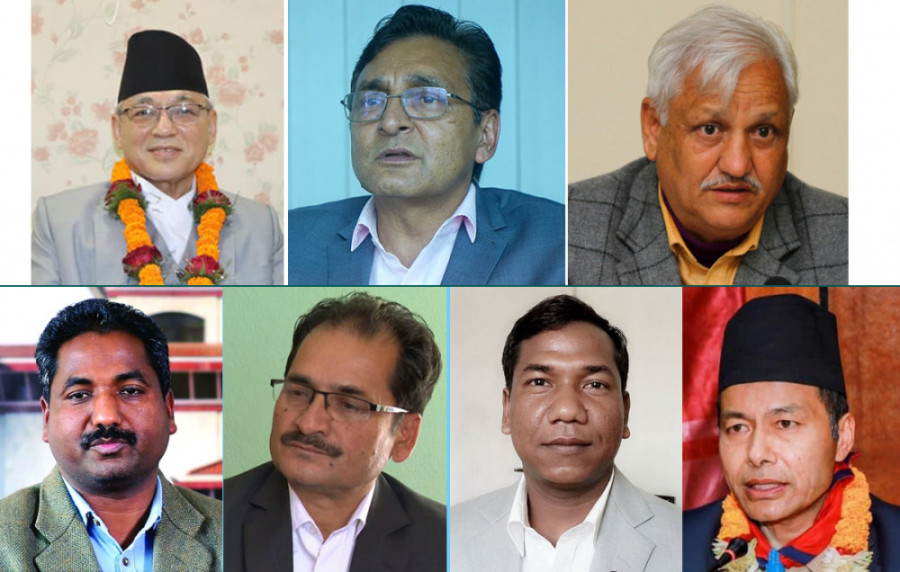Politics
Supreme Court scraps appointment of seven ministers who are not lawmakers
Chief Justice Rana’s bench says their appointment and oath, on May 14, prima facie, against constitutional provisions. All of them had joined the CPN-UML after deserting the Maoist Centre.
Post Report
The Supreme Court on Thursday annulled the appointment of seven ministers, days after they were administered oath of office and secrecy.
All the seven ministers had joined the CPN-UML after quitting the Communist Party of Nepal (Maoist Centre).
A single bench of Chief Justice Cholendra Shumsher Rana took a decision, saying their appointment as ministers was in violation of Article 78 as they were not members of the House of Representatives.
“The [seven miniseters’] appointment was scrapped on the grounds that the six-month provision of obtaining membership of the federal parliament after being appointed is applicable just for one time,” Kishor Poudel, a communication expert at the Supreme Court, told the Post.
After UML chair KP Sharma Oli was reappointed prime minister on May 13, days after losing the vote of confidence, he had retained the same Council of Ministers and had on May 14 administered oath of office to Ram Bahadur Thapa (home minister), Lekh Raj Bhatta (industry minister), Top Bahadur Rayamajhi (energy Minister), Prabhu Sah (urban development minister), Gauri Shankar Chaudhary (labour minister), Mani Thapa (minister for water supply and sanitation) and Dawa Lama (youth and sports minister).
“As per Article 78, the appointed ministers must obtain the membership of the federal parliament, but the defendants’ reappointment for the second time seems, prima facie, against the Clauses 1, 2 and 3 of Article 78 and the spirit of the constitution,” states the order issued by Rana. “An interim order has been issued not to allow them to carry out any duties in the capacity of ministers until this case is finalised, as their appointment and oath do not conform to the constitution.”
Article 78 (1) says the President may, on recommendation of the prime minister, appoint a person who is not a member of the federal parliament as a minister.
But Clauses 2 and 3 say: a minister appointed under Article 78 (1) must obtain membership of the federal parliament within six months from the date of taking oath by him or her; and in the event of failure to obtain membership of the federal parliament within the period, he or she shall not be qualified to be reappointed to the office of minister during the term of the then House of Representatives.
On April 6, the Maoist Centre had sacked Rayamajhi, Bhatta, Sah and Chaudhary as its lawmakers for siding with Oli. They were ministers in the Oli Cabinet. Oli, however, had reappointed them three days later.
Thapa, who had been home minister since 2018, was reappointed on April 18 after he was also sacked by the Maoist Centre.
Thapa and Lama, who were not the members of federal parliament, were appointed as ministers for the first time on December 25, five days after Oli dissolved the House of Representatives.
After the Oli government fell on May 10 after the prime minister lost the vote of confidence in the Parliament, he was allowed to continue the same Council of Ministers until a new one was constituted.
But the opposition parties failed to prove a majority to form a new government under Article 76 (2) by the deadline of 9pm of May 13.
President Bidya Devi Bhandari, hence, around 10pm on May 13 reappointed Oli as prime minister under Article 76 (3) as the leader of the party with the highest number of members in the House.
Oli had to reconstitute his Council of Ministers, but he retained the same one with the seven ministers who were not lawmakers. Oli was sworn in on May 14 and subsequently he administered oaths to the seven ministers.
Advocates Kapil Dev Dhakal and Biraj Thapa on Wednesday had filed two petitions separately at the Supreme Court, demanding the scrapping of the appointment of the seven ministers.




 9.8°C Kathmandu
9.8°C Kathmandu














